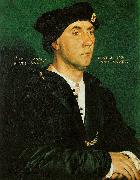
Oil On
Canvas, Real Flavor of Old Masters
|
Hans Holbein
|
|||
|
|
|||
| German 1497-1543 Hans Holbein Galleries Holbein always made highly detailed pencil drawings of his portrait subjects, often supplemented with ink and colored chalk. The drawings emphasize facial detail and usually did not include the hands; clothing was only indicated schematically. The outlines of these drawings were then transferred onto the support for the final painting using tiny holes in the paper through which powdered charcoal was transmitted; in later years Holbein used a kind of carbon paper. The final paintings thus had the same scale as the original drawings. Although the drawings were made as studies for paintings, they stand on their own as independent, finely wrought works of art. How many portraits have been lost can be seen from Holbein's book (nearly all pages in the Royal Collection) containing preparatory drawings for portraits - of eighty-five drawings, only a handful have surviving Holbein paintings, though often copies have survived. David Hockney has speculated in the Hockney-Falco thesis that Holbein used a concave mirror to project an image of the subject onto the drawing surface. The image was then traced. However this thesis has not met with general acceptance from art historians. A subtle ability to render character may be noted in Holbein's work, as can be seen in his portraits of Thomas Cromwell, Desiderius Erasmus, and Henry VIII. The end results are convincing as definitive images of the subjects' appearance and personality. | |||
|
|
|||
|
|
Sir Richard Southwell Hans Holbein11.jpg Painting ID:: 2431 Visit European Gallery |
1536 Galleria degli Uffizi, Florence | |
Height Width |
INS/CM |
||
|
X |
|
||
|
|
|||







